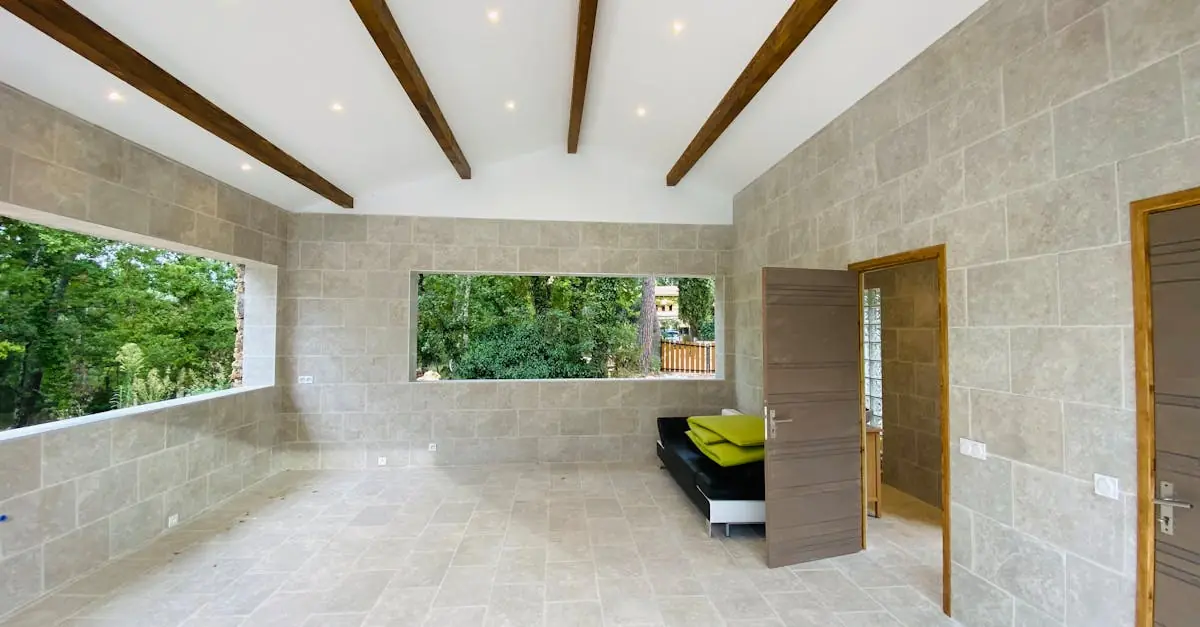When it comes to vacation homes, the dream of sun-soaked getaways can quickly turn into a renovation nightmare. Who’s footing the bill for that new roof or the fancy hot tub that’ll make your neighbors green with envy? The rules around renovations can get as murky as a pool in need of cleaning, but understanding who pays is crucial for keeping friendships intact and avoiding awkward family dinners.
Whether it’s a shared investment among friends or a family heirloom that needs a facelift, knowing the financial responsibilities can save everyone a lot of headaches. So grab your hard hat and a sense of humor, because navigating the world of vacation house renovations doesn’t have to be a chore. Let’s dive into the nitty-gritty of who pays, why it matters, and how to keep the peace while upgrading your paradise.
Table of Contents
ToggleOverview of Vacation House Rules
Vacation house rules dictate behaviors and responsibilities for shared living spaces. Such rules address essential areas, including renovations, use of facilities, and financial obligations. Clarifying these aspects prevents misunderstandings among co-owners or tenants.
Financial contributions for renovations often become contentious. Owners typically share costs, but discussions about responsibilities must happen upfront. Establishing a clear communication channel promotes transparency and mitigates future disputes.
Common practices outline that all owners contribute equally to enhancements. They may also agree on who decides which upgrades take precedence. In some cases, individuals who use the property more frequently may assume a larger share of costs.
Renovation agreements should specify expense types, including labor and materials. Written agreements enhance accountability and help owners maintain a friendly atmosphere. Considering creating a renovation budget that outlines projected expenses fosters unity.
Clarifying usage of funds can also reduce friction. Owners might find it useful to set guidelines on how additional costs will be handled. For instance, establishing a threshold for minor repairs can simplify decision-making.
Setting timeframes for renovations encourages amicable planning. Each party must consent on when renovations should occur, preventing disruptions to their vacation plans. Open dialogues about the frequency and scope of renovations move discussions toward consensus.
Overall, a thorough understanding of vacation house rules ensures a smoother online or offline renovation process. Each aspect, from financial responsibility to renovation management, supports maintaining positive relationships while enjoying shared property.
Understanding Renovation Responsibilities
Clarifying renovation responsibilities is vital in maintaining harmony among co-owners. Addressing individual ownership dynamics and shared ownership dynamics helps navigate financial obligations.
Individual Ownership Considerations
When a vacation house solely belongs to one person, that owner typically bears the full cost of renovations. They decide on the scope and style of improvements without external input. It’s crucial for individual owners to document decisions to ensure transparency. Owners might also consider how upgrades affect property value when planning renovations. If they plan to sell the property in the future, enhancements could yield significant returns.
Shared Ownership Dynamics
In shared ownership scenarios, groups often confront complex financial discussions. Each owner usually contributes to renovation costs based on their ownership percentage. Collaborative decision-making fosters agreement, which leads to smoother execution of plans. Owners may decide to establish a budget that reflects the priorities of all members. Open communication is essential in addressing concerns and preferences, ensuring everyone feels valued and respected. Formal agreements outlining responsibilities can mitigate disputes and promote accountability among owners.
Financial Agreements in Vacation Homes
Financial agreements play a crucial role in vacation home renovations. Clarity fosters trust and minimizes misunderstandings among co-owners.
Rental Income Impact on Renovations
Rental income significantly influences renovation budgets. This income can fund upgrades, benefiting all co-owners. For example, owners may decide to invest a portion of the rental proceeds into enhancements like kitchen remodels or new furnishings. Allocating a percentage of rental income for renovations helps ensure transparency and accountability. As long as all parties agree on the terms, rental income becomes a valuable resource for maintaining the property. Understanding the potential rental income impact allows co-owners to prioritize renovations that enhance guest experiences, ultimately maximizing profitability.
Cost-Sharing Arrangements
Cost-sharing arrangements define financial expectations among co-owners. Establishing a clear formula for how renovation expenses split promotes fairness. Owners may choose equal contributions or agree on contributions based on ownership percentages. For instance, if two owners split a property 50/50, shared costs should reflect that ratio. Documenting these arrangements in a written agreement helps avoid potential disputes. Regular communication about upcoming projects and expenses encourages collaborative decision-making. By formalizing cost-sharing methods, co-owners can ensure smoother renovations and maintain positive relationships throughout the process.
Legal Implications of Renovations
Understanding the legal implications surrounding renovations of vacation homes is vital for co-owners. Owners must review the property title and ownership structure to know their rights and obligations. Each state varies in regulations, so consulting with a real estate attorney ensures compliance and clarity.
Responsibilities for renovations often extend to financial contributions, necessitating clear agreements. Financial discussions can designate who pays for what, detailing whether costs are split equally or based on ownership shares. Legal documents detailing these agreements protect all parties and minimize conflicts in the future.
Permits and local regulations typically govern renovations, requiring adherence. Engaging with local authorities for necessary permits avoids potential fines and complications. Updating co-owners during this process fosters transparency and maintains a positive atmosphere.
Rental income also influences renovation decisions, allowing owners to allocate funds effectively. Distributing profits from renting the property can support renovation budgets, benefiting both guest experiences and property value. Every owner should agree on how income is reinvested into the property for shared enhancements.
Formulating an official contract that outlines renovation terms can prevent misunderstandings. Clarity about expenses, responsibilities, and timelines creates accountability among co-owners. Regular updates regarding progress and costs keep communication lines open and strengthen relationships.
Documentation is key to mitigating disputes related to renovations. Written records of agreements, discussions, and decisions offer protection and evidence if disagreements arise. Establishing clear protocols ensures all parties feel informed and respected throughout the renovation process.
Navigating the financial aspects of vacation home renovations can be tricky. Clear communication and well-defined agreements are essential for maintaining harmony among co-owners. By establishing rules around contributions and responsibilities upfront, everyone involved can feel secure in their investment.
It’s vital to document all agreements to prevent misunderstandings and ensure accountability. Regular updates on renovation progress and expenses foster trust and strengthen relationships. Ultimately, a collaborative approach to renovations not only enhances the property but also enriches the shared experience of ownership.




